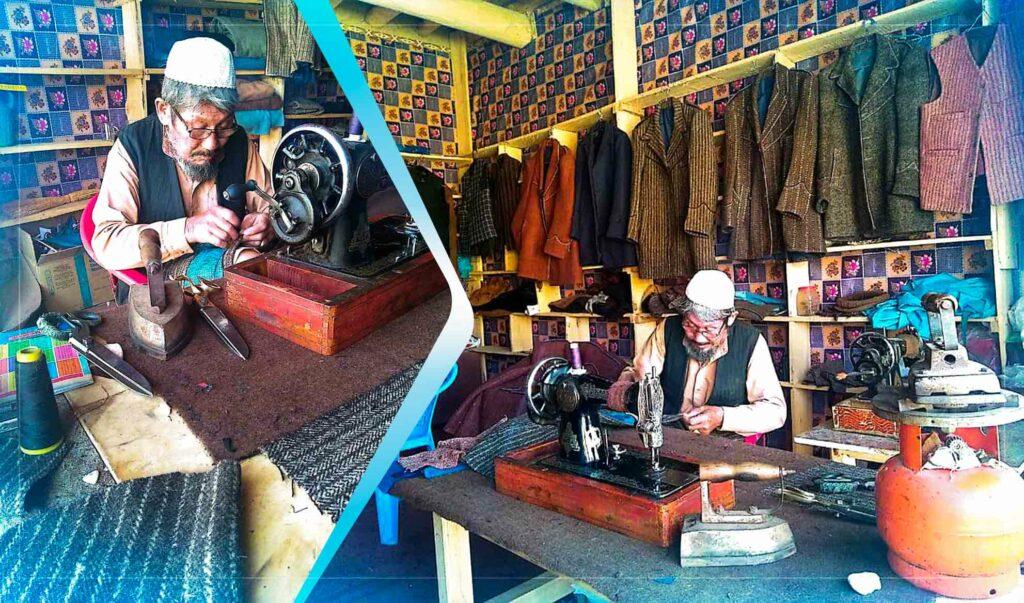NEILI (Pajhwok): In a remote and mountainous area of Miramor district of central Daikundi province, an elderly man named Khalifa Sarwar, known for his expertise in the barak cloth sewing, underlines a recent surge in the business.
Sarwar, who spent many years crafting fine coats, vests, and dresses from sheep’s wool, is not only pleased with the increased demand, but also with employment opportunities he has created for local women.
Fifteen years ago, Sarwar faced significant hardships, but found solace in his craft. He initially struggled, but his dedication to producing high-quality barak garments eventually paid off.
The elegance of his work has significantly boosted sales and attracted customers from various regions, including Daikundi, Balkh, and Kabul provinces.
Sarwar has played a crucial role in training numerous women in weaving and barak making, in collaboration with local organizations. These women now spin wool and produce barak garments at home, which they sell to Sarwar for sewing. This system has enabled them to earn a livelihood while contributing to the industry.
Sarwar explains each barak coat is sold for over 20,000 afghanis, with government employees and institutions being among his regular clients.
The production process involves weaving lamb’s wool, boiling it, and then rubbing it to soften the material before it is left in the sun to dry.
Sarwar claims that he is currently the only skilled barak maker in Daikundi and has established a strong reputation in the field.
The barak garments are appreciated for their warmth and fashionable designs, making them popular among buyers.
Sarwar notes that he has several high-value orders for indigo-colored barak items. While others in the Rabat area produce barak,
Sarwar remains the sole craftsman responsible for sewing them, working with his tools and a basic sewing machine in his small shop.
“My business recently flourished and now I work day and night and run my life with the income I get from producing and selling this special type of wool-cloth”.
Sarwar said: “No one can produce this type of wool cloth professionally in Daikundi province, but I am weak and sometimes unable to meet all of the orders of my customers.”
He asked the government to support him and create tuition for his business so he could pass on the skill to other people in the future.
According to his information, there was no textile factories to produce such type of wool-cloth in Daikundi and he used to produce such type of cloth using his ordinary tools.
However it is a risky business for Sarwar, but he said that he got a considerable income from weaving and producing such clothes.
As other districts in Daikundi have no such textile factories and producers to produce this type of cloth and buyers come from other areas to purchase his cloth.
One of his customers, Sayed Ahmad ordered a coat of wool-cloth for 21,000 afs. He told Pajhwok that he made the order due to the unique beauty of wool-cloth.
Ahmad said: “I saw one of our relatives who wore this type of coat, it was very nice so I decided to order one for myself as well.”
A number of other women also do some ordinary works of wool-cloth weaving, they said they could get an income for their families.
Masooma is one of such women, she told Pajhwok that she was raising rams and sheep for their wool.
Masooma said: “It is a good business to raise rams and sheep, I can sell both their wool and sheep in the market.”
“I cannot weave wool-cloth, but I can do some of its ordinary works of wool-yarn spinning and some other works.”
She clarified that many other women switched to this business and they could get an income for their families.
The wool-cloth is mostly produced in Rubat area of Meramoor district, local officials said.
Head of Industry and Commerce, Khan Ali Shahristani, said there was no textile factory for weaving the famous wool-cloth but a number of the residents produced it using their ordinary tools and resources.
The wool-cloth is mostly used by rich people because it is very expensive and unique.
He said the people knitted gloves, socks and waistcoats as from the wool-yarn and its products were very famous, Shahristani said.
The people in Daikundi used to produce the handicrafts using some ancient methods and such products are very famous.
aw/sa/ma







GET IN TOUCH
NEWSLETTER
SUGGEST A STORY
PAJHWOK MOBILE APP